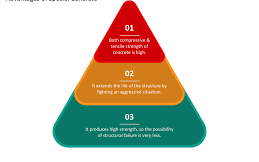Special concrete, also known as advanced or specialty concrete, refers to concrete mixes that are designed to have specific properties and characteristics to meet the unique requirements of particular construction projects. These specialized mixes offer a range of benefits compared to traditional concrete mixes. Here are some key benefits of using special concrete:
Enhanced Strength and Durability:
Special concrete mixes are often engineered to provide higher strength and increased durability. These mixes can incorporate additives, such as silica fume, fly ash, or slag, which improve the concrete’s compressive strength, flexural strength, and resistance to cracking and deterioration. This makes special concrete ideal for structures that require superior strength, such as high-rise buildings, bridges, and infrastructure projects.
Improved Workability:
Special concrete mixes can be formulated to have improved workability, making them easier to place, compact, and finish. This can be achieved through the use of superplasticizers, water-reducing admixtures, or viscosity-modifying agents. The increased workability allows for better construction efficiency, reduces labor requirements, and facilitates the placement of concrete in complex or congested areas.
Reduced Permeability:
Special concrete mixes can designed to have lower permeability, minimizing the penetration of moisture, chemicals, and aggressive substances into the concrete matrix. This helps to enhance the durability of structures, as it reduces the risk of corrosion of reinforcing steel and extends the service life of the concrete. Lower permeability is particularly beneficial for structures expos to harsh environmental conditions, such as marine environments or chemical storage facilities.
Increased Resistance to Environmental Factors:
Special concrete mixes can formulated to withstand specific environmental factors. Such as extreme temperatures, freeze-thaw cycles, or exposure to chemicals. These mixes can incorporate various additives or admixtures that enhance the concrete’s resistance to temperature variations, chemical attacks, alkali-aggregate reactions, or other detrimental effects caused by environmental factors. Special concrete is commonly used in infrastructure projects, such as roads, airports, and wastewater treatment plants, where resistance to environmental conditions is crucial. specialty concrete
Customized Performance Characteristics:
Special concrete allows for the customization of performance characteristics to suit the specific requirements of a project. Engineers can tailor the mix design to achieve desired properties. Such as high early strength, rapid setting, self-consolidating behavior, or reduced shrinkage. This flexibility in performance characteristics enables the optimization of concrete performance, ensuring that it meets the project’s unique demands.
Sustainability and Eco-Friendliness:
Some special concrete mixes incorporate recycled materials or waste by-products, making them more environmentally friendly and sustainable. The use of supplementary cementitious materials, such as fly ash or slag, reduces. The demand for virgin raw materials lowers the carbon footprint of concrete production. Additionally, special concrete mixes that enhance durability can contribute to the long-term sustainability of structures by reducing the need for frequent repairs or replacements. specialty concrete
In summary, special concrete offers several benefits, including enhanced strength and durability, improved workability, and reduced permeability. Increased resistance to environmental factors, customization of performance characteristics, and sustainability. These advantages make special concrete a valuable choice for a wide range of construction applications. Enabling the creation of more resilient, efficient, and long-lasting structures.

